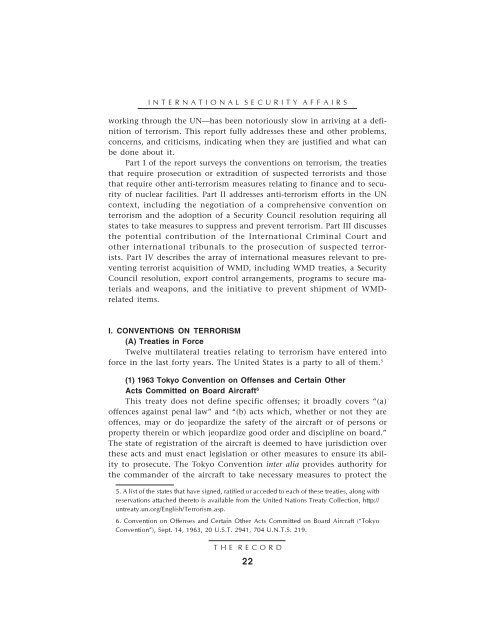2007 Issue 1 - New York City Bar Association
2007 Issue 1 - New York City Bar Association
2007 Issue 1 - New York City Bar Association
You also want an ePaper? Increase the reach of your titles
YUMPU automatically turns print PDFs into web optimized ePapers that Google loves.
I N T E R N A T I O N A L S E C U R I T Y A F F A I R S<br />
working through the UN—has been notoriously slow in arriving at a definition<br />
of terrorism. This report fully addresses these and other problems,<br />
concerns, and criticisms, indicating when they are justified and what can<br />
be done about it.<br />
Part I of the report surveys the conventions on terrorism, the treaties<br />
that require prosecution or extradition of suspected terrorists and those<br />
that require other anti-terrorism measures relating to finance and to security<br />
of nuclear facilities. Part II addresses anti-terrorism efforts in the UN<br />
context, including the negotiation of a comprehensive convention on<br />
terrorism and the adoption of a Security Council resolution requiring all<br />
states to take measures to suppress and prevent terrorism. Part III discusses<br />
the potential contribution of the International Criminal Court and<br />
other international tribunals to the prosecution of suspected terrorists.<br />
Part IV describes the array of international measures relevant to preventing<br />
terrorist acquisition of WMD, including WMD treaties, a Security<br />
Council resolution, export control arrangements, programs to secure materials<br />
and weapons, and the initiative to prevent shipment of WMDrelated<br />
items.<br />
I. CONVENTIONS ON TERRORISM<br />
(A) Treaties in Force<br />
Twelve multilateral treaties relating to terrorism have entered into<br />
force in the last forty years. The United States is a party to all of them. 5<br />
(1) 1963 Tokyo Convention on Offenses and Certain Other<br />
Acts Committed on Board Aircraft 6<br />
This treaty does not define specific offenses; it broadly covers “(a)<br />
offences against penal law” and “(b) acts which, whether or not they are<br />
offences, may or do jeopardize the safety of the aircraft or of persons or<br />
property therein or which jeopardize good order and discipline on board.”<br />
The state of registration of the aircraft is deemed to have jurisdiction over<br />
these acts and must enact legislation or other measures to ensure its ability<br />
to prosecute. The Tokyo Convention inter alia provides authority for<br />
the commander of the aircraft to take necessary measures to protect the<br />
5. A list of the states that have signed, ratified or acceded to each of these treaties, along with<br />
reservations attached thereto is available from the United Nations Treaty Collection, http://<br />
untreaty.un.org/English/Terrorism.asp.<br />
6. Convention on Offenses and Certain Other Acts Committed on Board Aircraft (“Tokyo<br />
Convention”), Sept. 14, 1963, 20 U.S.T. 2941, 704 U.N.T.S. 219.<br />
T H E R E C O R D<br />
22

















